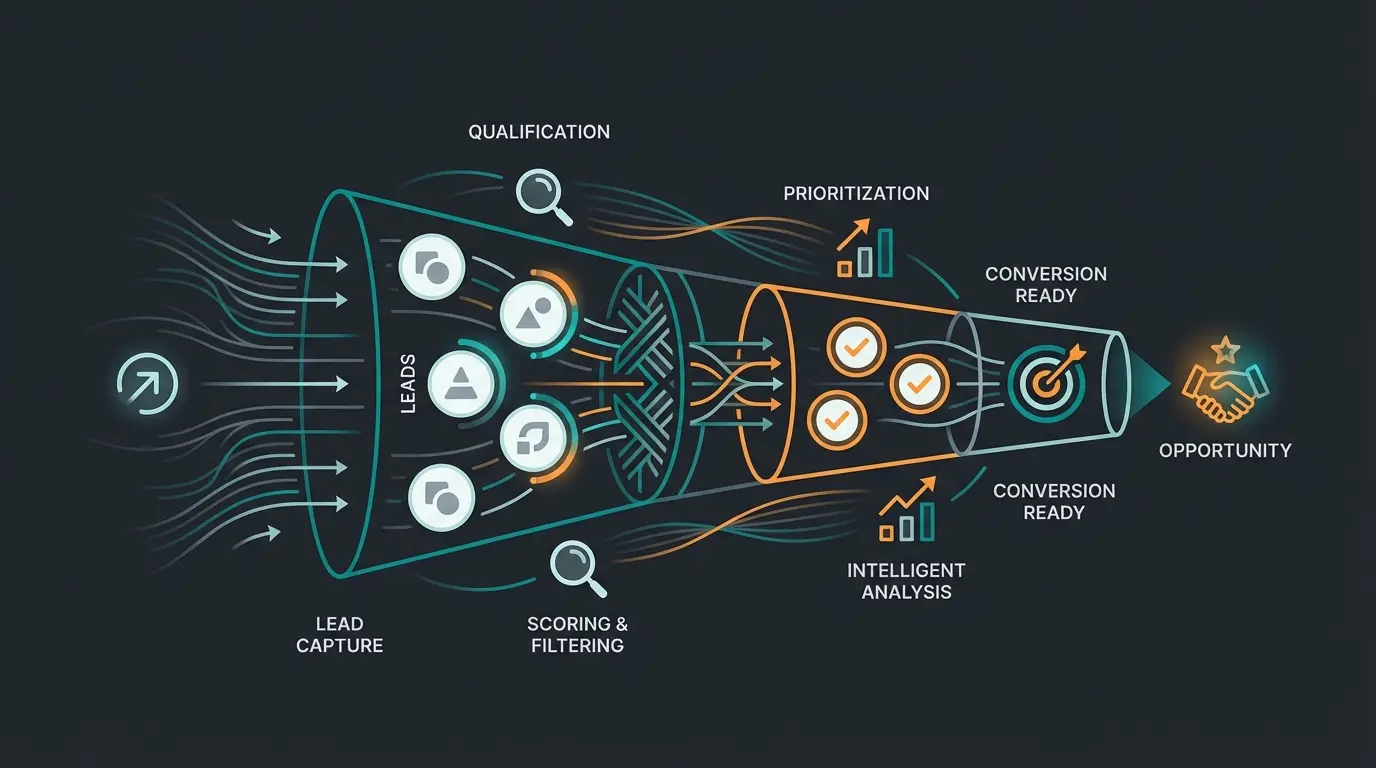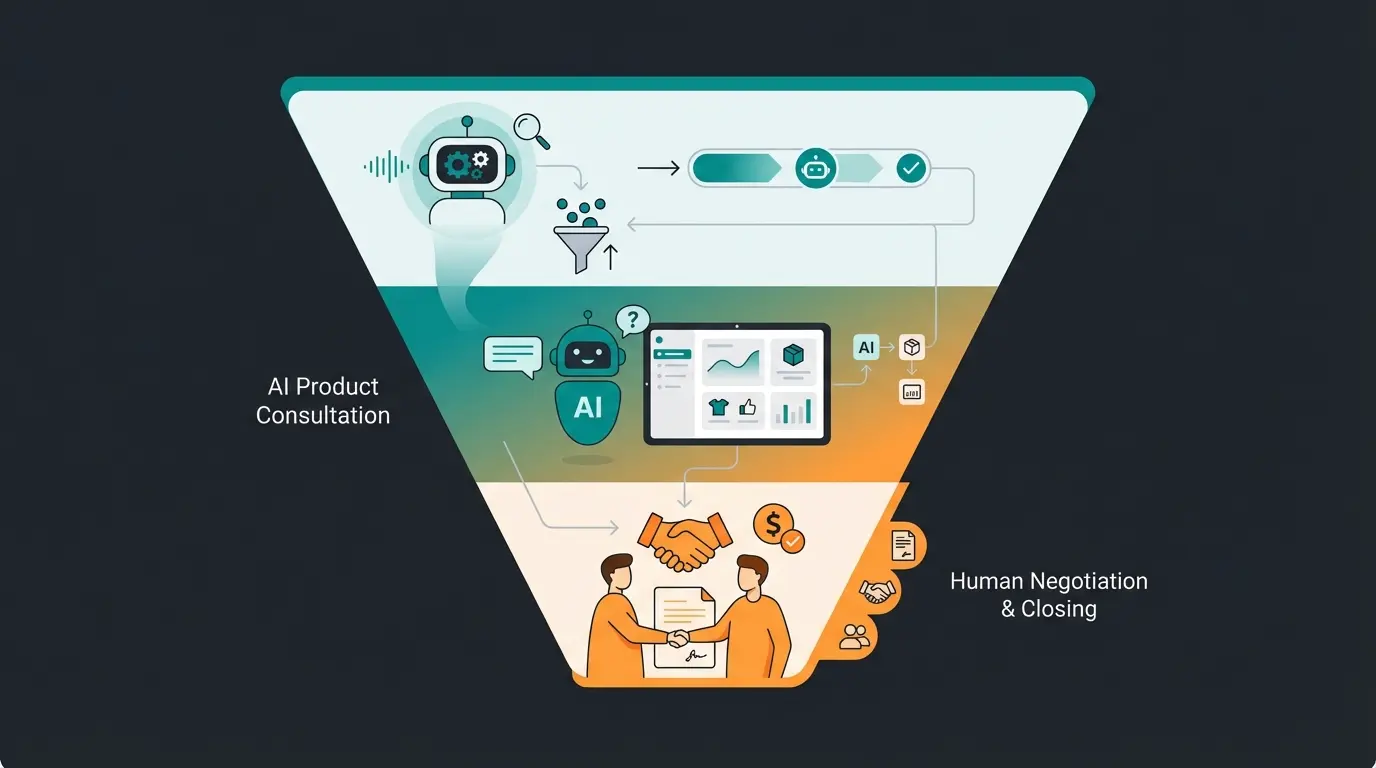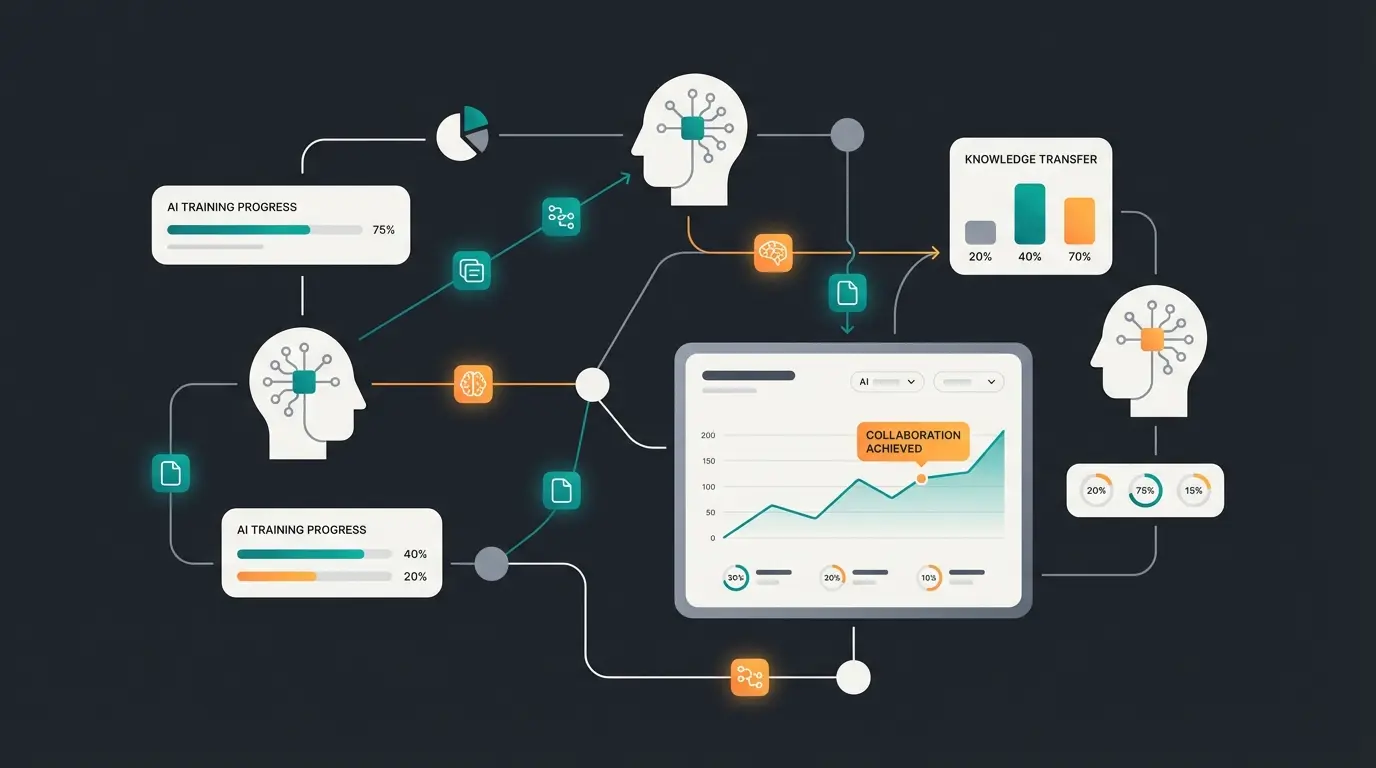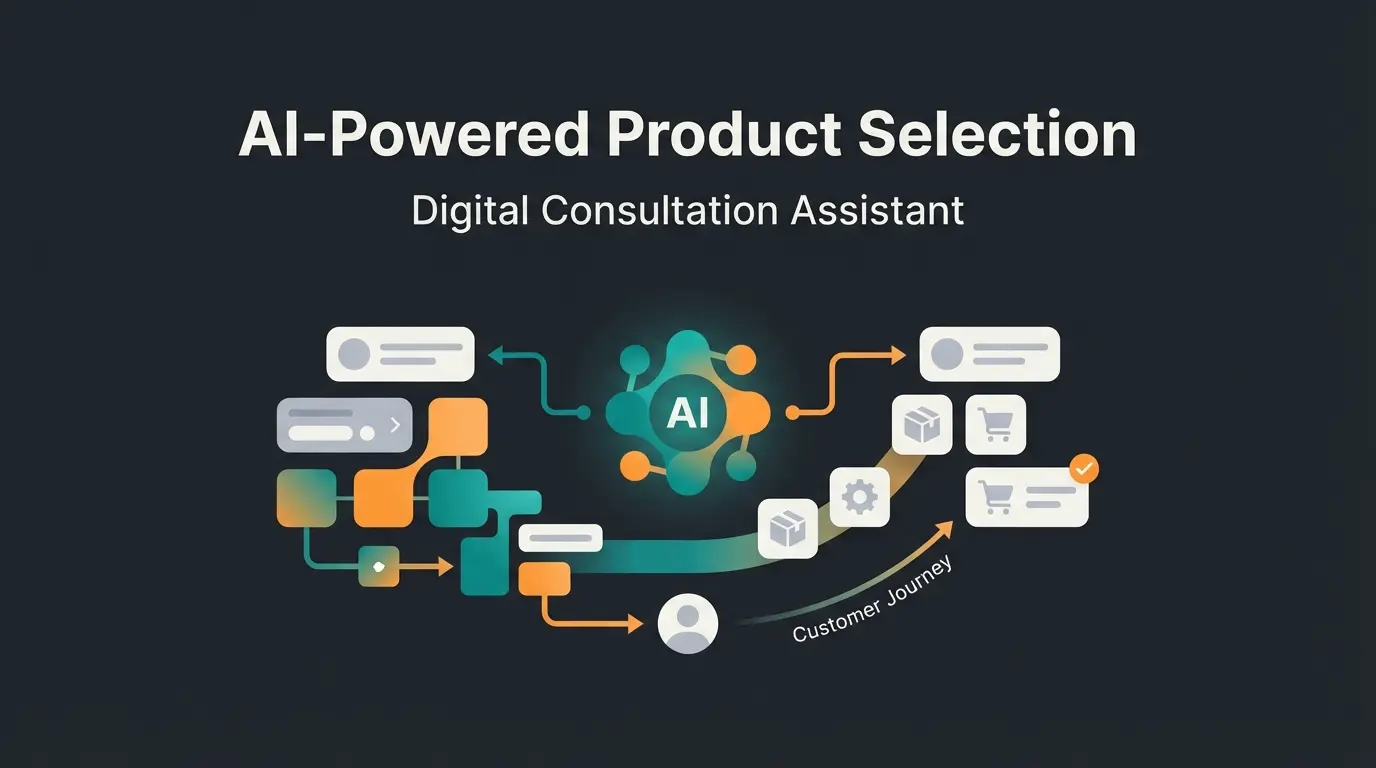Introduction: AI in Sales - A New Era Begins
The world of sales is undergoing a significant transformation. Artificial Intelligence (AI) has entered sales processes and promises to fundamentally change how companies market their products and services. The use of AI in sales opens new possibilities for efficiency improvements, customer acquisition, and revenue optimization.
According to current forecasts, the AI market will grow to an impressive $407 billion by 2027. This development underscores the growing importance of AI technologies across various industries, particularly in sales. Companies implementing AI solutions report significant improvements in productivity and customer satisfaction.
But here's what most businesses are getting wrong: they're still using AI as a glorified email spammer or FAQ answering machine. The real shift happening right now is toward Consultative AI—artificial intelligence that doesn't just automate tasks but actually understands your products deeply enough to advise customers on complex technical decisions.
In this comprehensive guide, we examine the applications and challenges of AI sales representatives. We explore how these innovative systems optimize the sales process, what benefits they offer, and what hurdles must be overcome during implementation. Additionally, we look at the future perspectives of AI in sales and how companies can prepare for this technological revolution.
What Are AI Sales Representatives?
AI sales representatives are advanced software systems based on artificial intelligence and machine learning. They support or partially replace human sales representatives in various tasks within the sales process. These virtual assistants use complex algorithms and data analysis to understand customer behavior, identify sales opportunities, and provide personalized recommendations.
Unlike traditional sales methods, AI sales representatives can process enormous amounts of data in real-time and derive valuable insights from it. They are capable of recognizing patterns, making predictions, and automated decisions that optimize the sales process.
AI systems in sales stand out for their ability to continuously learn and adapt. They improve their performance with every interaction and can thus provide increasingly accurate and relevant support. Key functions of AI sales representatives include:
- Automation: Taking over repetitive tasks like scheduling or data entry
- Analysis: Evaluating customer data to identify sales opportunities
- Forecasting: Predicting customer behavior and market trends
- Personalization: Creating tailored offers and communications
- Support: Providing relevant information for human sales representatives
AI sales representatives complement the capabilities of human sellers and enable companies to work more efficiently and achieve better results. They form a bridge between the analytical possibilities of modern technology and the interpersonal aspects of selling.
The 3 Levels of AI in Sales: A Framework
Not all AI implementations in sales are created equal. Understanding where different solutions fall on the sophistication spectrum helps businesses make smarter investment decisions. Here's a framework that clearly differentiates the three distinct levels of AI capability in sales:
Handles CRM data entry, basic forecasting, appointment scheduling, and report generation. Saves time but doesn't interact with customers directly.
Manages email generation, lead scoring, initial contact automation, and basic FAQ responses. Engages customers but with limited depth.
Conducts interactive product consultation, needs analysis, technical solution recommendations, and complex problem-solving. Acts as a digital product expert.
Most companies today are stuck at Level 1 or Level 2. They've automated data entry and maybe deployed a chatbot that can answer basic questions. But the transformative potential—and the competitive advantage—lies in Level 3: Consultative AI that can engage in complex product discussions, understand specific customer constraints, and recommend precisely the right solution.
Applications of AI in Sales
Automation of Routine Tasks
AI sales representatives are revolutionizing how companies handle routine tasks. These intelligent systems can take over a variety of time-intensive but necessary activities, allowing human sales representatives to focus on more strategic aspects of their work. Processes that can be automated through AI include:
- Scheduling: AI systems efficiently coordinate customer appointments and avoid conflicts
- Data Entry: Automatic updating of customer data and sales information in CRM systems
- Reporting: Generation of detailed sales reports and analyses without manual input
- Email Management: Sorting and prioritizing customer inquiries for faster response times
Through the automation of these tasks, companies can significantly increase their efficiency while reducing errors that can occur with manual processing. However, this is just the foundation—the real value comes when AI moves beyond these administrative functions.
Improved Lead Generation and Qualification
AI-powered systems are transforming how companies identify and evaluate potential customers. By analyzing large amounts of data, AI sales representatives can gain valuable insights into customer behavior and preferences. This enables more precise identification of promising leads and more effective qualification of potential customers.
A key advantage of this AI-powered lead generation is the ability to analyze customer interactions in real-time. AI chatbots can conduct conversations with website visitors, capture their interests, and automatically forward qualified leads to the sales team. This leads to a significant increase in sales process efficiency, as employees can focus on leads with a higher probability of closing.

AI-Powered Product Consultation: The Game Changer
Here's where most existing solutions fall short—and where the biggest opportunity lies. While competitors focus on simple FAQ bots that say things like "We have 3 pricing tiers," truly consultative AI can engage in dynamic, value-adding conversations: "Based on your need for X and Y, I recommend Tier 2 because..."
The difference is profound. Standard chatbots are reactive and static. They can only respond to questions they've been explicitly programmed to handle. Consultative AI, on the other hand, can ask potential customers about their requirements, conduct genuine needs analysis, and recommend the right product—not just any product.
This is particularly valuable for companies with complex products. Consider a manufacturer of industrial pumps. A customer might ask: "I need a pump for viscous liquids at 80°C that can handle 500 liters per hour with corrosion-resistant materials." A generic chatbot would fumble. A consultative AI, trained on product specifications and manuals, can recommend specific models with reasoning.
Personalized Customer Engagement
The ability to provide personalized customer engagement is one of the most significant advantages of AI in sales. AI systems can create individual customer profiles by analyzing data from various sources, including previous interactions, purchase history, and online behavior. Based on these profiles, AI sales representatives can generate tailored offers and recommendations precisely suited to the needs and preferences of each individual customer.
This personalized approach not only increases the relevance of communication but also boosts customer satisfaction and the likelihood of successful closure. AI can predict the optimal time for contact or identify a customer's preferred communication channel to maximize the effectiveness of sales efforts.
Predictive Analytics in Sales
Predictive Analytics, powered by AI, enables companies to forecast sales trends and proactively adjust their sales strategies. These advanced analytical methods use historical data, market trends, and external factors to predict future developments. Examples of using Predictive Analytics in sales include:
- Revenue Forecasting: Accurate prediction of sales figures for better resource planning
- Customer Churn: Early identification of customers with high churn risk
- Cross-Selling: Determining the best times and products for cross-selling offers
- Price Optimization: Dynamic price adjustments based on market conditions and customer profiles
Through the use of Predictive Analytics, companies can make data-driven decisions that lead to optimization of sales performance and revenue increases.
Generic Chatbot vs. AI Product Consultant
Understanding the difference between a generic chatbot and a true AI product consultant is crucial for making the right technology investment. This comparison highlights why the distinction matters for companies selling complex products:
| Feature | Generic Chatbot | AI Product Consultant |
|---|---|---|
| Knowledge Depth | FAQ-based, scripted responses | Deep technical knowledge from manuals and specs |
| Context Awareness | Low - treats each message independently | High - maintains conversation context and history |
| Primary Goal | Support deflection, basic information | Sales conversion through expert consultation |
| Data Source | Static scripts and decision trees | Dynamic knowledge base with RAG technology |
| Complex Questions | Escalates to human immediately | Handles technical inquiries independently |
| Personalization | Generic responses for all users | Tailored recommendations based on requirements |
| Accuracy | Risk of generic or irrelevant answers | Verified against company documentation |
The key differentiator is RAG (Retrieval-Augmented Generation) technology. This approach ensures the AI consultant retrieves information from verified company documents—product manuals, technical specifications, compatibility matrices—before generating responses. This addresses the "hallucination" concern that many German engineers and technical buyers rightfully have about AI systems.
Benefits of AI Sales Representatives
Efficiency Improvements
AI sales representatives offer impressive efficiency improvements in the sales process. They can work around the clock without needing breaks or vacation, leading to a significant increase in productivity. Concrete examples of time savings and optimized processes include:
- Fast Response Times: AI systems can answer customer inquiries within seconds, drastically reducing wait times
- Parallel Processing: Multiple customers can be served simultaneously without quality loss
- Automated Follow-up: AI can plan and execute follow-up activities without requiring manual intervention
This efficiency improvement not only leads to cost savings but also allows human employees to focus on more complex and strategic tasks.
Projected global AI market value
AI could boost US GDP by 2030
Continuous customer support without breaks
Potential increase in qualified lead handling
Enhanced Customer Experience
AI sales representatives contribute significantly to an improved customer experience. Through their ability to analyze and interpret large amounts of customer data, they can offer highly personalized and relevant interactions. This leads to increased customer satisfaction and stronger customer loyalty.
Such AI systems can answer complex questions, provide tailored recommendations, and ensure consistent quality in customer service. The ability to maintain context across conversations means customers don't have to repeat themselves—the AI remembers their requirements and preferences.
Data-Driven Decision Making
AI sales representatives enable well-founded, data-driven decision-making in the sales process. Through Big Data analysis, they can deliver valuable insights that human sales representatives might miss. Benefits include:
- Trend Analysis: Early detection of market trends and customer behavior patterns
- Performance Optimization: Identification of the most effective sales strategies based on data analysis
- Risk Assessment: More accurate evaluation of sales opportunities and potential risks
This data-driven approach enables companies to continuously refine and optimize their sales strategies based on real performance metrics rather than intuition alone.
Scalability of Expertise
A crucial advantage of AI sales representatives is the ability to scale sales activities without proportional personnel growth. AI systems can easily handle increasing inquiry volumes without requiring additional human resources. This is particularly valuable for companies experiencing rapid growth or managing seasonal fluctuations.
Consider this: Your best sales engineer can't talk to 1,000 potential customers at once. AI can. This scalability of expertise means that every website visitor can receive the same quality of technical consultation that previously only your top performers could provide.
Scalability also extends to the ability to serve multiple languages and markets without hiring additional staff. AI sales representatives can seamlessly switch between different languages and consider cultural nuances, facilitating global expansion.
Discover how AI-powered product consultation can transform your website into a 24/7 sales engineer—handling complex technical inquiries while your team focuses on closing deals.
Start Your Free TrialThe Hybrid Sales Funnel: Human + AI Collaboration
One of the biggest concerns about AI in sales is job replacement. Let's address this directly: the most successful implementations don't replace humans—they create a hybrid sales funnel where AI and humans each handle what they do best.

Top of Funnel (AI-Handled): Website traffic engagement, initial questions, basic qualification, 24/7 availability for international visitors in different time zones.
Middle of Funnel (AI-Handled): Needs analysis, product consultation, technical question handling, solution recommendations, configuration assistance.
Bottom of Funnel (Human-Handled): Complex negotiations, custom pricing discussions, relationship building, contract finalization, strategic account management.
The key is defining clear handoff triggers. When should the AI transfer to a human? Common triggers include: requests for custom pricing, enterprise-level inquiries, explicit requests to speak with a person, or conversations that exceed certain complexity thresholds. This hybrid model ensures customers get instant expert responses while humans focus on high-value activities where personal relationships matter most.
Challenges in Implementing AI in Sales
Data Privacy and Security
The use of AI in sales brings significant data privacy challenges. Processing large amounts of personal data through AI systems requires special precautions. Companies must ensure they comply with applicable data protection regulations and protect their customers' privacy.
Necessary security measures include:
- Encryption: Implementation of robust encryption techniques for sensitive customer data
- Access Controls: Strict regulations on who can access which data
- Regular Audits: Continuous review and updating of security measures
- Transparency: Clear communication to customers about how their data is used
Compliance with data protection and security standards is not only legally required but also crucial for customer trust in AI-supported sales processes.
Integration into Existing Systems
The integration of AI systems into existing sales processes and IT infrastructures presents technical challenges for companies. Existing CRM systems, databases, and communication tools must work seamlessly with the new AI technology.
Companies should choose a gradual approach to minimize compatibility issues. This includes careful selection of AI solutions that fit well into the existing IT landscape. Additionally, it's important to plan sufficient time for testing and adjustments to ensure a smooth transition.
Acceptance by Employees and Customers
The introduction of AI in sales can encounter resistance from both employees and customers. Sales representatives might fear that AI systems will threaten their jobs. Customers, on the other hand, might be skeptical about interacting with AI-controlled systems.
To promote acceptance, it's important to:
- Maintain transparent communication about the role of AI in the sales process
- Involve employees early in the implementation process
- Clearly demonstrate the benefits of AI support for employees and customers
- Offer training for employees to improve their skills in working with AI
Emphasizing that AI systems are meant to complement and not replace human sales representatives is essential. The combination of human expertise and AI support can lead to improved sales performance and customer satisfaction.
Addressing the Hallucination Problem
A legitimate concern, especially among technical buyers and engineers, is AI "hallucination"—where the system confidently provides incorrect information. This is particularly problematic in sales contexts where accuracy is essential for customer trust and regulatory compliance.
The solution lies in RAG (Retrieval-Augmented Generation) architecture. Instead of generating responses purely from trained patterns, consultative AI systems retrieve information from verified company documentation before responding. This means:
- Responses are grounded in actual product specifications and manuals
- Technical details are verified against company knowledge bases
- The AI can cite sources and explain its reasoning
- Guardrails prevent the system from speculating beyond verified information
This approach transforms AI from a potential liability into a reliable technical resource that customers can trust for accurate product information.
Ethical Considerations
The use of AI in sales raises important ethical questions. Transparency and fairness in customer service must be ensured. There's a risk that AI systems might unintentionally make discriminatory decisions or violate customer privacy.
Companies should develop clear ethical guidelines for the use of AI in sales. These should be regularly reviewed and adjusted to ensure that AI systems operate in accordance with societal values and legal requirements. Central ethical aspects include:
- Fairness: Avoiding discrimination and bias in AI decisions
- Transparency: Disclosure to customers when they're interacting with an AI system
- Accountability: Clear responsibilities for AI-supported decisions and their consequences
Implementation Guide: How to Introduce AI in Sales
Step 1: Data Preparation
Before any AI implementation, your data foundation must be solid. This means cleaning and organizing your product knowledge base—manuals, specifications, compatibility information, pricing structures, and FAQ content. The quality of your consultative AI directly depends on the quality of data it can access.
Key data preparation activities include:
- Auditing existing product documentation for completeness and accuracy
- Structuring information in formats the AI can efficiently retrieve
- Identifying gaps in documentation that need to be filled
- Establishing processes for keeping the knowledge base current
Step 2: Define the Consultation Logic
What questions should your AI ask to provide valuable recommendations? This requires mapping your sales discovery process into a framework the AI can follow. Work with your best sales engineers to understand:
- What information do you need to make a good product recommendation?
- What are the most common customer requirements and constraints?
- What technical specifications are most important for different use cases?
- How do you typically guide customers through the decision process?
Step 3: Establish Human Handoff Protocols
Defining clear triggers for when the AI should transfer to a human is crucial for both customer experience and sales effectiveness. Common handoff triggers include:
- Requests for custom pricing or enterprise agreements
- Highly complex configurations requiring human judgment
- Explicit customer requests to speak with a person
- Conversations indicating high-value opportunity requiring relationship building
- Questions outside the AI's verified knowledge domain
Step 4: Phased Rollout
A successful implementation of AI in sales requires a thoughtful, phased approach. Based on best practices, the following implementation plan is recommended:
Identify areas in sales that can most benefit from AI, map current processes, and define success metrics.
Test AI implementation in a limited scope to gather experience, identify issues, and build internal expertise.
Analyze pilot results, gather user feedback, and adjust AI systems based on learnings.
Gradually expand AI deployment to additional sales areas based on pilot success.
Regular monitoring, performance review, and ongoing improvements to AI processes.
During implementation, it's important to remain flexible and be ready to adjust the approach based on feedback and results. Close collaboration between IT, sales, and customer service is crucial for success.
Training and Professional Development
The successful introduction of AI in sales depends significantly on employees' ability to work effectively with these systems. Comprehensive training and professional development measures are therefore essential.
Recommendations for training programs:
- Convey basic AI concepts and their application in sales
- Offer practical exercises for using the specific AI tools in the company
- Conduct training on interpreting AI-generated data and recommendations
- Provide regular updates and refresher courses to keep pace with evolving technology
Additionally, companies should foster a culture of continuous learning where employees are encouraged to constantly expand their knowledge about AI and its applications in sales. This can be supported through internal workshops, external training, or attendance at industry conferences.

Future Perspectives: AI in Sales
The development of AI in sales is advancing rapidly and promises to fundamentally change the industry. Experts predict a range of trends that will shape the future of AI-supported sales:
- Hyper-Personalization: AI systems will be able to analyze customer profiles even more precisely and create tailored offers in real-time based on comprehensive data analysis and behavioral predictions.
- Predictive Selling: Advanced algorithms will predict purchase intentions more precisely and enable proactive sales strategies that anticipate customer needs before they're expressed.
- Emotional Intelligence: AI sales representatives will increasingly be able to recognize emotional nuances in customer conversations and respond appropriately, creating more natural interactions.
- AR/VR Integration: Augmented and Virtual Reality will combine with AI to open entirely new possibilities for virtual product presentations and consultation conversations.
These innovations will not only increase efficiency in sales but also elevate the customer experience to a new level. At the same time, the question arises of how the role of human sales representatives will evolve. It's likely they will increasingly focus on complex consulting and strategic tasks while AI systems handle routine activities and initial technical consultations.
The integration of AI into sales is expected to lead to a significant productivity increase. According to a forecast from Forbes, AI could boost US GDP by 21% by 2030. This underscores the enormous economic potential of this technology in the sales sector.
Frequently Asked Questions About AI in Sales
No, AI is designed to complement human sales representatives, not replace them. The most effective implementations use a hybrid model where AI handles routine inquiries, initial qualification, and technical product consultation, while humans focus on complex negotiations, relationship building, and strategic account management. This allows sales teams to be more productive and focus on high-value activities.
Regular chatbots use scripted responses and decision trees, handling only questions they've been explicitly programmed for. Consultative AI uses advanced technologies like RAG (Retrieval-Augmented Generation) to understand complex queries, retrieve information from verified product documentation, and provide personalized recommendations based on specific customer requirements. It can handle nuanced technical discussions that would stump a traditional chatbot.
The key is RAG architecture, which grounds AI responses in verified company documentation rather than generating answers from patterns alone. The AI retrieves information from product manuals, specifications, and knowledge bases before responding, then can cite its sources. Additionally, guardrails prevent the system from speculating beyond verified information, and clear handoff protocols transfer complex queries to human experts when needed.
ROI varies by implementation, but common benefits include: 24/7 availability for customer inquiries, handling 3x or more lead volume without proportional staff increases, faster response times (seconds vs. hours), more consistent qualification, and freeing human salespeople to focus on closing deals rather than answering repetitive questions. The AI market's projected growth to $407 billion by 2027 reflects the significant returns companies are experiencing.
Implementation timelines vary based on complexity, but a typical phased approach includes: 2-4 weeks for data preparation and knowledge base organization, 4-6 weeks for pilot deployment in a limited scope, 2-4 weeks for evaluation and optimization, then gradual scaling. Most companies see initial results within 2-3 months, with full deployment taking 4-6 months depending on organizational size and technical infrastructure.
Conclusion: The Future Belongs to Consultative AI
AI sales representatives are revolutionizing how companies interact with their customers and design sales processes. The technology offers impressive possibilities for efficiency improvement, personalization, and data-driven decision-making in sales. At the same time, it presents companies with new challenges regarding data privacy, integration, and ethical questions.
The success of AI in sales will depend on how well companies manage to meaningfully integrate this technology into their existing processes while not losing sight of the human aspect of customer relationships. AI should be seen as a complement to, not a replacement for, human sales representatives.
The key insight from this analysis is clear: the companies that will win are those moving beyond Level 1 and Level 2 AI implementations. While competitors are still automating appointment scheduling and sending AI-generated spam emails, forward-thinking organizations are deploying Consultative AI that acts as a digital product expert—available 24/7, speaking multiple languages, and capable of handling the complex technical discussions that previously required your best sales engineers.
With the right strategy and a balanced approach, AI in sales can become a decisive competitive advantage and help companies succeed in an increasingly digitalized business world. The question is no longer whether to implement AI in sales, but how quickly you can move from basic automation to true consultative intelligence.
Stop losing leads to slow response times and generic chatbots. Our AI solution handles complex technical inquiries while your team focuses on closing deals. See how consultative AI can revolutionize your sales process.
Get Started Today
